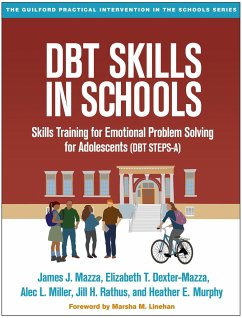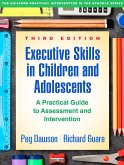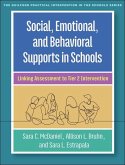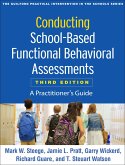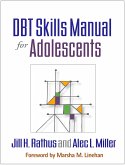James J. Mazza (United States University of Washington), Elizabeth T. Dexter-Mazza, Alec L. Miller (United States Long Island University Post)
DBT Skills in Schools
Skills Training for Emotional Problem Solving for Adolescents (DBT STEPS-A)
James J. Mazza (United States University of Washington), Elizabeth T. Dexter-Mazza, Alec L. Miller (United States Long Island University Post)
DBT Skills in Schools
Skills Training for Emotional Problem Solving for Adolescents (DBT STEPS-A)
- Broschiertes Buch
- Merkliste
- Auf die Merkliste
- Bewerten Bewerten
- Teilen
- Produkt teilen
- Produkterinnerung
- Produkterinnerung
Dialectical behavior therapy (DBT) skills have been demonstrated to be effective in helping adolescents manage difficult emotional situations, cope with stress, and make better decisions. From leading experts in DBT and school-based interventions, this unique manual offers the first nonclinical application of DBT skills.
Andere Kunden interessierten sich auch für
![Coaching Students with Executive Skills Challenges, Second Edition Coaching Students with Executive Skills Challenges, Second Edition]() Peg Dawson (Center for Learning and United Sta Attention DisordersCoaching Students with Executive Skills Challenges, Second Edition52,99 €
Peg Dawson (Center for Learning and United Sta Attention DisordersCoaching Students with Executive Skills Challenges, Second Edition52,99 €![Social Justice in Schools Social Justice in Schools]() Charles A. BarrettSocial Justice in Schools45,99 €
Charles A. BarrettSocial Justice in Schools45,99 €![Executive Skills in Children and Adolescents Executive Skills in Children and Adolescents]() Peg DawsonExecutive Skills in Children and Adolescents62,99 €
Peg DawsonExecutive Skills in Children and Adolescents62,99 €![Social, Emotional, and Behavioral Supports in Schools Social, Emotional, and Behavioral Supports in Schools]() Sara C. McDanielSocial, Emotional, and Behavioral Supports in Schools45,99 €
Sara C. McDanielSocial, Emotional, and Behavioral Supports in Schools45,99 €![Conducting School-Based Functional Behavioral Assessments, Third Edition Conducting School-Based Functional Behavioral Assessments, Third Edition]() Mark W. Steege (United States University of Southern Maine)Conducting School-Based Functional Behavioral Assessments, Third Edition58,99 €
Mark W. Steege (United States University of Southern Maine)Conducting School-Based Functional Behavioral Assessments, Third Edition58,99 €![DBT Metaphors and Stories DBT Metaphors and Stories]() James J. Esmail (Private practice, Ohio, USA)DBT Metaphors and Stories45,99 €
James J. Esmail (Private practice, Ohio, USA)DBT Metaphors and Stories45,99 €![Dbt Skills Manual for Adolescents Dbt Skills Manual for Adolescents]() Jill H. Rathus (United States Long Island University Post)Dbt Skills Manual for Adolescents69,99 €
Jill H. Rathus (United States Long Island University Post)Dbt Skills Manual for Adolescents69,99 €-
-
-
Dialectical behavior therapy (DBT) skills have been demonstrated to be effective in helping adolescents manage difficult emotional situations, cope with stress, and make better decisions. From leading experts in DBT and school-based interventions, this unique manual offers the first nonclinical application of DBT skills.
Produktdetails
- Produktdetails
- The Guilford Practical Intervention in the Schools Series
- Verlag: Guilford Publications
- Seitenzahl: 490
- Erscheinungstermin: 22. Juli 2016
- Englisch
- Abmessung: 266mm x 207mm x 27mm
- Gewicht: 1052g
- ISBN-13: 9781462525591
- ISBN-10: 1462525598
- Artikelnr.: 43855034
- Herstellerkennzeichnung
- Libri GmbH
- Europaallee 1
- 36244 Bad Hersfeld
- gpsr@libri.de
- The Guilford Practical Intervention in the Schools Series
- Verlag: Guilford Publications
- Seitenzahl: 490
- Erscheinungstermin: 22. Juli 2016
- Englisch
- Abmessung: 266mm x 207mm x 27mm
- Gewicht: 1052g
- ISBN-13: 9781462525591
- ISBN-10: 1462525598
- Artikelnr.: 43855034
- Herstellerkennzeichnung
- Libri GmbH
- Europaallee 1
- 36244 Bad Hersfeld
- gpsr@libri.de
James J. Mazza, PhD, is Professor in the College of Education at the University of Washington, where he teaches and conducts research in the field of adolescent mental health. Dr. Mazza's research focuses particularly on adolescent internalizing disorders, such as depression, anxiety, posttraumatic stress disorder, exposure to violence, and, especially, suicidal behavior. His work also examines the complex relationships among adolescent mental health issues, social-emotional abilities, and academic skills through multi-tiered systems of support. Dr. Mazza has written extensively on how to identify youth who are at risk for suicidal behavior, as well as on how to develop social-emotional learning (SEL) curricula to help all students learn emotion regulation skills. He has worked with over 30 school districts and thousands of school personnel in developing and implementing comprehensive school-based suicide identification and prevention strategies for adolescents. Dr. Mazza also provides consultation and training to school personnel internationally on implementing DBT STEPS-A in schools, on developing mental health intervention services within multi-tiered systems of support, and on integrating SEL curricula as a part of a school system's role in educating the whole child. He is the coowner of a private practice in Seattle, Washington. Elizabeth T. Dexter-Mazza, PsyD, is the co-owner of a private practice in Seattle, Washington, where she conducts comprehensive dialectical behavior therapy (DBT) and skillsbased coaching for adolescents and adults and provides parent coaching and support to family members and friends of individuals with emotion dysregulation. Dr. Dexter-Mazza provides training and consultation to schools, mental health agencies, and individuals in implementing DBT skills and therapy. She is also a trainer for Behavioral Tech, a company that offers DBT trainings to mental health professionals around the world. Dr. Dexter-Mazza completed her postdoctoral fellowship under the direction of Marsha M. Linehan at the Behavioral Research and Therapy Clinics (BRTC) at the University of Washington. She served as Clinical Director and a research therapist at the BRTC for Dr. Linehan's research studies, which provided both individual DBT and DBT group skills training. Dr. Dexter-Mazza has published several book chapters and peer-reviewed articles on DBT, borderline personality disorder, and graduate school training in managing suicidal clients. Alec L. Miller, PsyD, is Cofounder and Clinical Director of Cognitive and Behavioral Consultants, White Plains and New York, New York, and Clinical Professor of Psychiatry and Behavioral Sciences at Montefiore Medical Center/Albert Einstein College of Medicine, Bronx, New York. Dr. Miller served for over 20 years as Professor of Clinical Psychiatry and Behavioral Sciences, Chief of Child and Adolescent Psychology, Director of the Adolescent Depression and Suicide Program, and Associate Director of Psychology Training at Montefiore Medical Center. He is a scientific advisor to the American Foundation of Suicide Prevention and the National Educational Alliance of Borderline Personality Disorder, a Fellow of the American Psychological Association, and past Chair of the International Society for the Improvement and Training of DBT. He has published numerous peer-reviewed journal articles, book chapters, and books on topics including DBT, adolescent suicide, childhood maltreatment, and borderline personality disorder. He is the coauthor of DBT Skills in Schools, DBT Skills Manual for Adolescents, and Dialectical Behavior Therapy with Suicidal Adolescents. He has conducted over 400 lectures and workshops around the world, training thousands of mental health professionals in DBT. Jill H. Rathus, PhD, is Professor of Psychology at Long Island University Post, where she directs the DBT scientist-practitioner training program within the clinical psychology doctoral program. She is also Co-Director and Co-Founder of Cognitive Behavioral Associates, a group private practice in Great Neck, New York, specializing in DBT and cognitive-behavioral therapy (CBT). Her clinical and research interests include DBT, CBT, adolescent suicidality, intimate partner violence, anxiety disorders, and assessment. Dr. Rathus has developed and conducted programs in DBT for adolescents and adults as well as males referred for intimate partner violence, and has received foundation and university funding to study, adapt, and develop assessment tools for DBT. She has published numerous peer-reviewed articles and chapters on DBT, adolescent suicide, couple therapy, intimate partner violence, personality disorders, assessment, and anxiety disorders. She is the coauthor of books including DBT Skills in Schools, DBT Skills Manual for Adolescents, and Dialectical Behavior Therapy with Suicidal Adolescents. Heather E. Murphy, PhD, NCSP, has a private practice in Seattle, Washington, where she works with self-harming and suicidal adolescents. She is adjunct faculty in educational psychology at the University of Washington. Dr. Murphy previously worked as a school psychologist in elementary, middle, and high schools for 7 years. During that time, she developed districtwide procedures for intervening with suicidal youth and standard practices for responding to a suicide. Dr. Murphy's research, publications, and clinical work focus on adolescent mental health, LGBT youth, and suicide intervention with adolescents.
I. Overview of DBT STEPS-A
1. What Is DBT Skills Training for Emotional Problem Solving for
Adolescents (DBT STEPS-A)?
2. Practical Issues in Schools
3. Teaching DBT STEPS-A to Challenging Students
II. Instructor Information, Lesson Plans, and Tests
Lesson 1. Orientation
Lesson 2. Dialectics
Lesson 3. Mindfulness: Wise Mind
Lesson 4. Mindfulness: "What" Skills
Lesson 5. Mindfulness: "How" Skills
Lesson 6. Distress Tolerance: Introduction to Crisis Survival Skills, and
ACCEPTS
Lesson 7. Distress Tolerance: Self-Soothe and IMPROVE the Moment
Lesson 8. Distress Tolerance: TIP Skills for Managing Extreme Emotions
Lesson 9. Distress Tolerance: Pros and Cons
Lesson 10. Distress Tolerance: Introduction to Reality Acceptance Skills,
and Radical Acceptance
Lesson 11. Distress Tolerance: Turning the Mind and Willingness
Lesson 12. Distress Tolerance: Mindfulness of Current Thoughts (and
Distress Tolerance Test)
Lesson 13. Core Mindfulness: Wise Mind
Lesson 14. Core Mindfulness: "What" and "How" Skills
Lesson 15. Emotion Regulation: Goals of Emotion Regulation and Functions of
Emotions
Lesson 16. Emotion Regulation: Describing Emotions
Lesson 17. Emotion Regulation: Check the Facts and Opposite Action
Lesson 18. Emotion Regulation: Problem Solving
Lesson 19. Emotion Regulation: The A of ABC PLEASE
Lesson 20. Emotion Regulation: The BC PLEASE of ABC PLEASE
Lesson 21. Emotion Regulation:The Wave Skill-- Mindfulness of Current
Emotion
Lesson 22. Emotion Regulation: Emotion Regulation Test
Lesson 23. Mindfulness: Wise Mind Review
Lesson 24. Mindfulness: "What" and "How" Skills Review
Lesson 25. Interpersonal Effectiveness: Goals and Overview
Lesson 26. Interpersonal Effectiveness: DEAR MAN Skills
Lesson 27. Interpersonal Effectiveness: GIVE Skills
Lesson 28. Interpersonal Effectiveness: FAST Skills
Lesson 29. Interpersonal Effectiveness: Evaluating Options for How
Intensely to Ask or Say No
Lesson 30. Interpersonal Effectiveness: Interpersonal Effectiveness Test
III. Student Handouts
1. What Is DBT Skills Training for Emotional Problem Solving for
Adolescents (DBT STEPS-A)?
2. Practical Issues in Schools
3. Teaching DBT STEPS-A to Challenging Students
II. Instructor Information, Lesson Plans, and Tests
Lesson 1. Orientation
Lesson 2. Dialectics
Lesson 3. Mindfulness: Wise Mind
Lesson 4. Mindfulness: "What" Skills
Lesson 5. Mindfulness: "How" Skills
Lesson 6. Distress Tolerance: Introduction to Crisis Survival Skills, and
ACCEPTS
Lesson 7. Distress Tolerance: Self-Soothe and IMPROVE the Moment
Lesson 8. Distress Tolerance: TIP Skills for Managing Extreme Emotions
Lesson 9. Distress Tolerance: Pros and Cons
Lesson 10. Distress Tolerance: Introduction to Reality Acceptance Skills,
and Radical Acceptance
Lesson 11. Distress Tolerance: Turning the Mind and Willingness
Lesson 12. Distress Tolerance: Mindfulness of Current Thoughts (and
Distress Tolerance Test)
Lesson 13. Core Mindfulness: Wise Mind
Lesson 14. Core Mindfulness: "What" and "How" Skills
Lesson 15. Emotion Regulation: Goals of Emotion Regulation and Functions of
Emotions
Lesson 16. Emotion Regulation: Describing Emotions
Lesson 17. Emotion Regulation: Check the Facts and Opposite Action
Lesson 18. Emotion Regulation: Problem Solving
Lesson 19. Emotion Regulation: The A of ABC PLEASE
Lesson 20. Emotion Regulation: The BC PLEASE of ABC PLEASE
Lesson 21. Emotion Regulation:The Wave Skill-- Mindfulness of Current
Emotion
Lesson 22. Emotion Regulation: Emotion Regulation Test
Lesson 23. Mindfulness: Wise Mind Review
Lesson 24. Mindfulness: "What" and "How" Skills Review
Lesson 25. Interpersonal Effectiveness: Goals and Overview
Lesson 26. Interpersonal Effectiveness: DEAR MAN Skills
Lesson 27. Interpersonal Effectiveness: GIVE Skills
Lesson 28. Interpersonal Effectiveness: FAST Skills
Lesson 29. Interpersonal Effectiveness: Evaluating Options for How
Intensely to Ask or Say No
Lesson 30. Interpersonal Effectiveness: Interpersonal Effectiveness Test
III. Student Handouts
I. Overview of DBT STEPS-A
1. What Is DBT Skills Training for Emotional Problem Solving for
Adolescents (DBT STEPS-A)?
2. Practical Issues in Schools
3. Teaching DBT STEPS-A to Challenging Students
II. Instructor Information, Lesson Plans, and Tests
Lesson 1. Orientation
Lesson 2. Dialectics
Lesson 3. Mindfulness: Wise Mind
Lesson 4. Mindfulness: "What" Skills
Lesson 5. Mindfulness: "How" Skills
Lesson 6. Distress Tolerance: Introduction to Crisis Survival Skills, and
ACCEPTS
Lesson 7. Distress Tolerance: Self-Soothe and IMPROVE the Moment
Lesson 8. Distress Tolerance: TIP Skills for Managing Extreme Emotions
Lesson 9. Distress Tolerance: Pros and Cons
Lesson 10. Distress Tolerance: Introduction to Reality Acceptance Skills,
and Radical Acceptance
Lesson 11. Distress Tolerance: Turning the Mind and Willingness
Lesson 12. Distress Tolerance: Mindfulness of Current Thoughts (and
Distress Tolerance Test)
Lesson 13. Core Mindfulness: Wise Mind
Lesson 14. Core Mindfulness: "What" and "How" Skills
Lesson 15. Emotion Regulation: Goals of Emotion Regulation and Functions of
Emotions
Lesson 16. Emotion Regulation: Describing Emotions
Lesson 17. Emotion Regulation: Check the Facts and Opposite Action
Lesson 18. Emotion Regulation: Problem Solving
Lesson 19. Emotion Regulation: The A of ABC PLEASE
Lesson 20. Emotion Regulation: The BC PLEASE of ABC PLEASE
Lesson 21. Emotion Regulation:The Wave Skill-- Mindfulness of Current
Emotion
Lesson 22. Emotion Regulation: Emotion Regulation Test
Lesson 23. Mindfulness: Wise Mind Review
Lesson 24. Mindfulness: "What" and "How" Skills Review
Lesson 25. Interpersonal Effectiveness: Goals and Overview
Lesson 26. Interpersonal Effectiveness: DEAR MAN Skills
Lesson 27. Interpersonal Effectiveness: GIVE Skills
Lesson 28. Interpersonal Effectiveness: FAST Skills
Lesson 29. Interpersonal Effectiveness: Evaluating Options for How
Intensely to Ask or Say No
Lesson 30. Interpersonal Effectiveness: Interpersonal Effectiveness Test
III. Student Handouts
1. What Is DBT Skills Training for Emotional Problem Solving for
Adolescents (DBT STEPS-A)?
2. Practical Issues in Schools
3. Teaching DBT STEPS-A to Challenging Students
II. Instructor Information, Lesson Plans, and Tests
Lesson 1. Orientation
Lesson 2. Dialectics
Lesson 3. Mindfulness: Wise Mind
Lesson 4. Mindfulness: "What" Skills
Lesson 5. Mindfulness: "How" Skills
Lesson 6. Distress Tolerance: Introduction to Crisis Survival Skills, and
ACCEPTS
Lesson 7. Distress Tolerance: Self-Soothe and IMPROVE the Moment
Lesson 8. Distress Tolerance: TIP Skills for Managing Extreme Emotions
Lesson 9. Distress Tolerance: Pros and Cons
Lesson 10. Distress Tolerance: Introduction to Reality Acceptance Skills,
and Radical Acceptance
Lesson 11. Distress Tolerance: Turning the Mind and Willingness
Lesson 12. Distress Tolerance: Mindfulness of Current Thoughts (and
Distress Tolerance Test)
Lesson 13. Core Mindfulness: Wise Mind
Lesson 14. Core Mindfulness: "What" and "How" Skills
Lesson 15. Emotion Regulation: Goals of Emotion Regulation and Functions of
Emotions
Lesson 16. Emotion Regulation: Describing Emotions
Lesson 17. Emotion Regulation: Check the Facts and Opposite Action
Lesson 18. Emotion Regulation: Problem Solving
Lesson 19. Emotion Regulation: The A of ABC PLEASE
Lesson 20. Emotion Regulation: The BC PLEASE of ABC PLEASE
Lesson 21. Emotion Regulation:The Wave Skill-- Mindfulness of Current
Emotion
Lesson 22. Emotion Regulation: Emotion Regulation Test
Lesson 23. Mindfulness: Wise Mind Review
Lesson 24. Mindfulness: "What" and "How" Skills Review
Lesson 25. Interpersonal Effectiveness: Goals and Overview
Lesson 26. Interpersonal Effectiveness: DEAR MAN Skills
Lesson 27. Interpersonal Effectiveness: GIVE Skills
Lesson 28. Interpersonal Effectiveness: FAST Skills
Lesson 29. Interpersonal Effectiveness: Evaluating Options for How
Intensely to Ask or Say No
Lesson 30. Interpersonal Effectiveness: Interpersonal Effectiveness Test
III. Student Handouts

